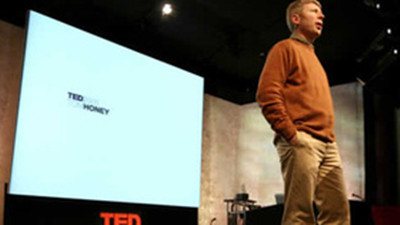The supreme commander toying with expendable units in a great campaign.
在一場大戰(zhàn)中,最高指揮官玩弄著可被犧牲掉的部隊(duì)。
We are still left with a God who can do the tsunami and allow Auschwitz.
留給我們的仍然是一個(gè)可以引發(fā)海嘯、允許奧斯威辛集中營存在的上帝。
In his great novel, The Brothers Karamazov, Dostoevsky gives these words to Ivan,addressed to his naive and devout younger brother, Alyosha:
在著名的小說《卡拉馬佐夫兄弟》中,陀斯妥耶夫斯基以伊萬之口,對他天真虔誠的弟弟阿遼沙說:
If the sufferings of children go to make up the sum of sufferings which is necessary for the purchase of truth,then I say beforehand that the entire truth is not worth such a price.
如果需要用孩子們的痛苦來湊足購買真理所需的代價(jià)的話,我會(huì)事先說,整個(gè)真理不值這個(gè)價(jià)錢。
We cannot afford to pay so much for admission.
我們買不起這么昂貴的入場券。

It is not God that I do not accept.
我不是不接受上帝,
I merely, most respectfully, return Him the ticket.
我只是恭敬地退回他的門票而已。
Or perhaps God set the whole universe going at the beginning and then relinquished control forever,so that natural processes could occur, and evolution run its course.
或者也許,上帝在創(chuàng)造整個(gè)宇宙的時(shí)候設(shè)定好了一切,然后永遠(yuǎn)地放棄了控制,因此過程可以自然地發(fā)生,按進(jìn)化論而展開。
This seems more acceptable,but it still leaves God with the ultimate moral responsibility.
這似乎更加容易接受一些,但這仍然使上帝負(fù)有最終的道德責(zé)任。
Is God a cold, unfeeling spectator?
上帝是一個(gè)冷酷無情的旁觀者嗎?
Or a powerless lover, watching with infinite compassion things God is unable to control or change?
或者上帝愛莫能助,以無限的同情看著事情的發(fā)生,而無法控制或改變?
Is God intimately involved in our suffering,so that He feels it in His own being?
上帝是否深切地感受到我們的痛苦,從而覺得那也是他自己的痛苦?
If we believe something like this, we must let go of the puppet-master completely,take our leave of the almighty controller, abandon traditional models.
如果我們相信這樣的觀點(diǎn),我們必須徹底拋棄認(rèn)為上帝是傀儡操縱者,全能主宰者的看法,放棄傳統(tǒng)的信仰模式。
We must think again about God.
我們必須重新思考上帝。
Maybe God doesn't do things at all.
也許上帝什么事也沒做。
Maybe God isn't an agent like all of us are agents.
也許上帝不是我們這樣的代理人。
Early religious thought conceived God as a sort of superhuman person,doing things all over the place.
早期的宗教思想認(rèn)為上帝是一種超人,到處做一些事情。比如:
Beating up the Egyptians, drowning them in the Red Sea, wasting cities, getting angry.
毆打埃及人,把他們淹死在紅海,毀滅城市,大發(fā)雷霆。
The people knew their God by His mighty acts.
人們通過上帝的這些超凡舉動(dòng)認(rèn)識(shí)上帝。
But what if God doesn't act? What if God doesn't do things at all?
但是,如果上帝沒有舉動(dòng)呢?如果上帝根本沒有做任何事情呢?
What if God is in things?
如果上帝就在事物中呢?
The loving soul of the universe.
比如是宇宙中關(guān)愛的靈魂,
An in-dwelling compassionate presence, underpinning and sustaining all things.
支撐并維持所有事物存在的內(nèi)在的一股仁慈的能量。
What if God is in things?
如果上帝就在事物中呢?
In the infinitely complex network of relationships and connections that make up life.
在構(gòu)成生命的無限復(fù)雜的關(guān)連網(wǎng)絡(luò)中,
In the natural cycle of life and death,
在必然不斷發(fā)生的生命與死亡、
the creation and destruction that must happen continuously.
創(chuàng)造與毀滅的自然周期中,
In the process of evolution.
在進(jìn)化的過程中,
In the incredible intricacy and magnificence of the natural world.
在令人難以置信的復(fù)雜性和自然界的輝煌中,
In the collective unconscious, the soul of the human race.
在集體無意識(shí)、人類的靈魂中,
In you, in me, mind and body and spirit.
在你中、我中,頭腦中、身體中和精神中,
In the tsunami, in the victims. In the depth of things.
在海嘯中,在死難者中,在事物的深處,
In presence and in absence. In simplicity and complexity.
在存在與虛無中,在簡單和復(fù)雜中,
In change and development and growth.
在變化、發(fā)展、壯大中。
How does this in-ness, this innerness, this interiority of God work?
怎么合理詮釋上帝的這種 同在性、內(nèi)性、內(nèi)在性 ?
It's hard to conceive, and begs more questions.
人們難以理解,并提出更多的問題。
Is God just another name for the universe,
也許上帝只是宇宙的另一個(gè)名字,
with no independent existence at all?
而根本不是一個(gè)獨(dú)立的存在?
I don't know.
我不知道
To what extent can we ascribe personality to God?
在多大程度上我們可以給上帝賦予人格?
I don't know.
我不知道。



